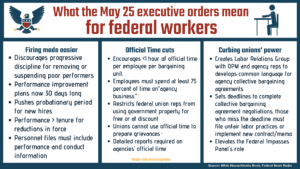
You’re fired. Have a great weekend!
The Trump administration's three new executive orders on employee relations aim to speed things up.
Presidential administrations routinely issue controversial material late on Fridays. They want to avoid having it get too much attention in the “news cycle,” whatever that is.
So it was with a trio of executive orders released just before last weekend. Just before Memorial Day — a three-day weekend. The release wan’t totally stealthy. The administration held a group phone-in for reporters who follow the arcana of federal operations.
The executive orders shouldn’t have surprised those who watch these things. The administration has been signaling what it wants to do for months. Basically, streamline firing procedures, speed up and narrow collective bargaining agreements, and restrict official time. A combination of vague and specific guidance, the EOs change things as much as an EO can, absent more basic reforms by Congress.
I’d caution people to read the EOs before rushing to judgment on how draconian they might be. When you do, you’ll find a lot of legalistic jargon but also an array of numbers. For example:
- 15 days: That’s how long after an employee shows he or she can’t cut it managers should issue notices of adverse actions.
- 30 days: That’s the recommended leadtime for notices of adverse actions following the period “to demonstrate acceptable performance.” That performance improvement period itself, or PIP, is also to be limited to 30 days.
- 1 hour: The maximum allowable “union time rate.” That’s the number of union hours in a year, divided by the number of employees in the bargaining unit. Agency managers are instructed to limit the rate to one hour. Let’s say a work-year has 2,000 hours. In a 1,000-person bargaining unit, that means 1 person could work fulltime on union business.
- 1,000: The number of bargaining unit employees that qualify an agency for participation in the new Labor Relations Group. The LRG, let’s say, acts as a sort of interagency clearinghouse for model contract clauses and bargaining terms.
- 6 weeks: The allowable time to set ground rules for new contract bargaining talks.
- 6 months: The maximum allowable bargaining period to reach an agreement before heading to the Federal Mediation and Conciliation Service for help.
Draconian? Managers might welcome the ability to remove an employee in a couple of months. Bargaining unit employees used to much longer PIPs will object. A month-long period to improve will certainly focus minds on the giving and receiving end, though.
What about distinguishing between performance, which can be subjective, and misconduct, which in theory is cut and dried?
Take Roseanne Barr for example. My problem with the Roseanne sitcom is, or was, I don’t think she’s a very good actress. The lines seemed forced, the timing always a bit off. That’s performance. But Barr’s now-infamous tweet, that’s misconduct.
The EOs contain lots of language on sorting out performance and misconduct, and treating each employee uniquely. If someone falsifies vendor invoices and shares kickbacks, that’s one thing. If he or she giggles at something the boss says in a meeting, that’s something else.
Merit system principles are often discussed in terms of employee rights. But they also govern employee responsibilities. These three EOs emphasize responsibilities, both of rank-and-file and of management. The danger for managers is, and always has been, separating personal feelings from performance. If you supervise an excellent performer you just don’t like, learn to live with the person. More often managers must deal with likable people who just don’t perform well. That’s tough personally, but speed-to-decision — yanking off the Band-Aid — can be the best way forward.
Copyright © 2025 Federal News Network. All rights reserved. This website is not intended for users located within the European Economic Area.
Tom Temin is host of the Federal Drive and has been providing insight on federal technology and management issues for more than 30 years.
Follow @tteminWFED
Related Stories

What changes (and doesn’t) under Trump’s new employee removal executive order






